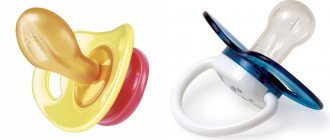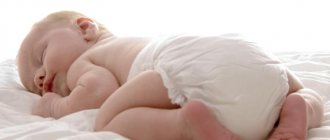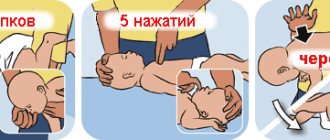What should a child's sleep be like?
Most newborns sleep restlessly throughout the day and night until about 3 months. Closer to the age of one and a half years, the situation improves during the day, but night awakenings can continue for another 6 months to a year. And that's okay.
From a physiological point of view, a newborn's sleep for up to a year should not be long. In infancy, babies wake up to eat, drink, and play. To figure out how a newborn should sleep at the correct time, study the approximate table of the children's regime:
- Up to 3 months, children sleep 18–20 hours a day. Night sleep is 4 hours.
- At 4-6 months - 15-18 hours, of which at night - 8-10 hours.
- At 6-8 months - 14-18 hours, night sleep will be 10-12 hours.
Gradually, by the age of one year, babies sleep less and less during the day and more at night. They stop eating in the morning and can hold urine for 8–10 hours of sleep at night.
This means there should be fewer awakenings.
Here is another fact that justifies frequent anxiety at night. These are the stages of sleep. In children they are shorter than in adults. Let's figure it out in order.
Human sleep consists of the following stages:
- falling asleep (drowsiness);
- REM sleep;
- superficial sleep;
- slow sleep;
- deep phase of sleep.
For an infant, each stage takes 30 minutes, for an adult - 2 hours. Until six months, children almost do not plunge into the deep phase and sleep superficially. Hence the twitching, crying, anxiety. By age 2, REM sleep will take up about 30–50% of the night, so your baby will wake up much less often or sleep soundly all the time.
On a note! American pediatricians believe that children under 5 months sleep poorly for physiological, natural reasons. They do not see signs of neurological pathologies in this. Russian doctors think differently.
Why does a baby have a light sleeper?
A child's sound sleep in the first year of his life is considered a necessary condition for the normal development of the child's body. It is also a signal that everything is in order with the baby’s health. During periods of wakefulness, infants may act restless, but such activity does not always indicate problems. Disturbance in night sleep in an infant may be a sign of malfunctioning systems or organs, so the symptom cannot be ignored. Insomnia can also occur against the background of natural physiological processes or a violation of the principles of organizing rest. In any case, we must do everything possible to get rid of disturbing manifestations as quickly as possible.
The presence of a problem in a baby can cause problems in the functioning of organs.
Causes
Factors that often provoke poor sleep in a child can be divided into physiological and external, psycho-emotional and pathological. The first groups do not require medication or medical supervision. It is enough to take independent measures to eliminate them or wait until the baby grows up.
The pathological causes of twitching, screaming in sleep and insomnia must be identified together with a neurologist, and undergo examinations and courses of therapy to eliminate them.
Physiological and external
First, let's look at the natural negative factors that are associated with the functioning of the human body. A healthy newborn baby sleeps restlessly for the following physiological reasons:
- Hunger, thirst . Artificial babies and babies wake up at the call of the stomach. After sucking out the dose of milk, they calmly fall asleep.
- Cold . The cause may be the described diaper or a fallen blanket.
- Pain during teething .
Children react more strongly to the appearance of their first teeth. They can creak their gums, incisors, squeak, and rub their cheeks with their hands. After 8–10 months, molars erupt almost painlessly. - Colic . They suffer from 1–2 months. The tummy is swollen, seething, gases come out with difficulty. The baby strains, turns, and may cry out in pain. The situation will improve itself when the baby is 4–6 months old.
- Own movements . The baby learns to roll over, wave his arms and legs. This is necessary for babies in order to crawl and walk in the future. From movements in a dream, the baby wakes up, begins to twirl even more, sometimes gets scared and cries. Very tiny children manage to hit themselves in the face and lift their blankets up. Mothers need to carefully monitor their baby's sleep until he can control his movements.
- Colds . The baby sleeps restlessly if his temperature is elevated, his nose is stuffy, he coughs, sneezes. At the same time he makes strange sounds, grunts when breathing, and tosses and turns a lot.
- I wanted to go to the toilet . A normally developing body will wake an infant to poop or pee. Children can control these processes at about one year of age. The signal for mom to poop will be grunting or shuddering after urinating.
This group also includes negative environmental factors:
- loud sounds;
- sharp knock, scream;
- uncomfortable bed;
- dry and hot air in the room.
On a note! In the womb, children are limited to the space of the uterus. From the 32nd week they cannot swim or move freely in the amniotic fluid. After birth, they are frightened by the huge space around them and the lack of restrictions on their arms and legs.
To reduce negative reactions and fear at night, it is recommended to freely swaddle children up to 4 months. It is simply impossible to swing your limbs in such a robe.
Psycho-emotional
They are determined by the type of temperament of the baby and the created conditions for development and life. There are several factors that provoke restless sleep:
- Violation of the child's sleep patterns and activity.
- The infant experienced stress (positive or negative) during the day.
- Increased anxiety. It is observed in children with mental and psychological problems. Such babies need special care, the constant presence of their parents nearby, and long-term lulling.
- The baby does not move enough while awake, that is, it does not get tired and does not want to sleep.
- Features of temperament. Hyperactive children, choleric and sanguine people sleep poorly due to emotional overload, and often startle in their sleep.
- The mother left the room when the baby fell asleep. The baby woke up and was afraid of loneliness.
Increased excitability at night manifests itself as follows: the child will wave his arms, talk (babble), sob, experiencing the events of the day in his sleep, crawl on the bed and kick if the mother moves him to his place.
Pathological
Pathological causes of poor sleep every night include the following congenital and acquired diseases:
- Lack of vitamins A, D, Ca. An infant sweats and gets nervous not only at night, but also during the day. If there is a lack of calcium, the baby suffers from cramps. At the moment of the shudder, the baby writhes, wriggles its whole body, arches its back and head.
- Allergies, dermatitis. Accompanied by itching, rash, abdominal pain. The baby wants to scratch the skin on the body and face, he experiences discomfort and burning.
- Congenital feature of the nasal passages. This defect causes difficulty breathing. The child cannot sleep soundly, constantly groans, and often suffers from acute respiratory infections and acute respiratory viral infections.
- Otitis. The baby's ear hurts when he sleeps. It is not difficult to recognize otitis media: the baby shakes and turns his head, screams, suddenly starts crying, bends over when trying to put him in the crib, is capricious all day, and has hyperthermia.
- Neurological diseases. Epilepsy, encephalopathy. In addition to insomnia day and night, these diseases have other symptoms that are more noticeable in a one-year-old baby and older children: a feeling of heaviness in the head, weakness, poor coordination of movements, low levels of memory and attention.
- Enuresis. This is urinary incontinence during night sleep. It occurs in children after one year and is usually cured by school age. At the same time, during urination, babies do not wake up or begin to fidget from the feeling of fullness of the organ. They go to the toilet in the deep sleep phase, not noticing the trouble. But they wake up from the cold because of the wet bed.
On a note! There is an opinion that the full moon affects children's sleep. Pediatricians from the USA were interested in these issues and began to analyze the sleep of newborns at different periods of the month. According to the data obtained, lunar phases affect the health of children extremely rarely; this phenomenon is considered a coincidence.
Listen to what Dr. Komarovsky says about this problem:
Types and reasons
The forms of sleep disturbance in a child are not as easy to differentiate as in the case of adult patients. Sometimes difficulties falling asleep, senseless awakenings at night, or the superficiality of blackouts are not obvious, and it seems to parents that everything is within the normal range.
It is important to remember that up to 4 months the baby should rest at least 16-18 hours, regardless of the time of day.
Usually he falls asleep without problems after eating, and a new period of wakefulness occurs after 2-4 hours. As the child gets older, the number of hours of sleep decreases.
Insomnia in an infant can be the result of the following reasons:
If there is a deviation, the child may cry constantly.
When signs of sleep disturbance appear in infants, it is important to identify the causes of the problem and eliminate them as quickly as possible. If you simply try to stop the manifestations with the help of medications, you can provoke serious disruptions in the functioning of the body, which is still being formed.
How to fight
A baby and parents need sound sleep like air.
If a newborn sleeps restlessly every night, then during the day he will whine, scream, and be capricious. The following methods help to cope with the problem without the help of doctors:
- Change the crib, mattress, pillow if the reason lies in the inconvenience of the place to sleep. Choose bedding in calm tones, cover the bed with a canopy.
- Put your baby to bed immediately after feedings and baths.
- Before going to bed, you should not drink heavily; it is advisable to go to the potty or change a diaper.
- Follow a daily routine; do not allow children under 2–3 years of age not to sleep during the day.
- Walk a lot, play during the day, so that by the evening the baby is tired.
- In the nursery, turn on the humidifier at night and thoroughly ventilate the room.
- If your baby wakes up at the wrong time, talk to him quietly, change his clothes carefully, and don’t turn on the light. It is better not to lift the toddler from the crib at all, but to try to put him to sleep again. He must understand the difference between day and night.
- Get into the habit of wishing for good dreams, reading books before your night's rest, and not playing active games in the evening. Come up with your own ritual and observe it every day.
- Create a quiet, friendly environment in the house so that the newborn does not experience stress from quarrels and swearing.
- Teach a five-month-old baby to sleep on his side if he has rhinitis or ARVI. This makes it easier for your nose to breathe.
- When the little one has grown up and can explain the cause of insomnia and fear, discuss his nightmares and reassure him.
- If you suspect that your child is sleeping restlessly at night due to illness or developmental disorders, consult a doctor.
- For colic, when the baby does not stop groaning and groaning all night, massage, warm the diaper and apply it to the tummy. It is also useful to review the diet of a nursing mother or change the milk formula.
I have an opinion! If your baby wakes you up all night, sleep together. Sleeping with parents is an ideal night's rest for a newborn.
Features of sleep in newborns
Sleep is one of the main components of a child’s normal development. its deficiency may cause neurological diseases in the baby. Every mother should know about the sleeping habits of a newborn. Some babies sleep almost around the clock, while others constantly wake up and cannot fall asleep for a long time. That’s why it’s important to find out how and how long infants should sleep, as well as what parents need to do to improve the quality of their baby’s sleep.
Sleeping and waking patterns of a newborn by week
Causes of restless sleep in a newborn
Due to the immaturity of the brain, deep (slow) sleep is absent in children under one month old. Until this age, there is only its prototype - the so-called quiet sleep, which lasts a few minutes. The rest of the time the baby sleeps superficially. This means that the newborn does not go into deep sleep. Brain maturation in infants occurs individually; the timing and speed of development may vary from child to child. On average, infants enter deep sleep between the ages of one and three months. This is the most important reason why a newborn writhes in his sleep and sleeps restlessly, but there are others:
1. The baby is hot. Parents often swaddle and wrap the baby. discomfort, the newborn cries a lot in his sleep, tosses and turns and wakes up more often than usual. 2. Overfilled diaper. It needs to be changed every 2-3 hours as babies defecate frequently. Urine and feces irritate the skin, so the child may experience itching and other discomfort in the perineal area. 3. Overexcitement. Some mothers think that if they put their baby to bed later, he will sleep longer than usual. This is a misconception. overexcitement and extreme fatigue, the child falls asleep worse and sleeps restlessly. 4. Neurological problems. Children who have suffered a birth injury may experience increased intracranial pressure, headaches, and tearfulness. These babies often have sleep disturbances. 5. The baby is hungry. If the mother does not produce enough milk, the baby does not sleep well because he is constantly hungry. A newborn smacks his lips in his sleep, turns around, cries and wakes up prematurely. 6. Hypertonicity. Many infants have overstrained muscle fibers in their arms and legs. For this reason, young children often startle in their sleep and wake themselves up. By the age of two months, the tone weakens, so the baby sleeps more peacefully. If your newborn throws his head back during sleep and shudders very often, you should show him to a doctor. Such symptoms may indicate neurological problems.
Attention! There is no reason to worry if a newborn baby sighs in his sleep, occasionally makes chaotic movements, sobs or groans. This activity is characteristic of the rapid phase of sleep, which in infants predominates over the slow phase.
Should you rock your newborn to sleep?
According to experts, a healthy and well-fed child, who is not bothered by anything, goes to sleep easily and quickly. He doesn't need rocking. It is enough for him to feel the mother’s warmth, which has a calming effect. If a newborn cannot fall asleep for a long time, the interval of wakefulness was probably too long and the child was overexcited. In this case, it is quite difficult to lay him down, but you can still avoid motion sickness if you resort to the following methods:
1. Free swaddling. Pediatricians recommend wrapping a newborn in a diaper, but not tying the arms and legs tightly. A soft tissue cocoon reminds a newborn of the sensations that accompanied him during intrauterine development. 2. Massage. Light massaging movements before bedtime relax the baby's muscles and help him calm down. 3. Swimming. Just being in warm water has a calming effect. If you wash your baby in a bath with herbal extracts added, he will fall asleep much faster and sleep longer.
Recommended sleeping positions for a newborn by month
Until the age of one and a half months, pediatricians recommend putting the baby to sleep only on his back. In the first days of his life, a newborn does not know how to hold his head straight; it turns on its own to the right or left. Thanks to this, when regurgitating, the mouth is freed from vomit. The side-lying position is suitable for babies aged two or three months who already know how to roll over on their own. Newborns are not placed in this way for several reasons:
What folk remedies help?
A competent doctor will never recommend using medications for insomnia for infants. Poor sleep before the age of one year is not the main sign of any disease and does not need to be specifically treated. But you can help your child calm down before a night's rest with the help of safe folk herbal recipes. Infusions and relaxing baths with decoctions act gently and do not have side effects.
Valerian
Give your little toddler a decoction of valerian root. But no more than 5 days in a row. The taste of the drink is not very pleasant, it is bitter. The baby may wrinkle its face and grimace, then add a little honey to the tea. To prepare the medicine, take 5 grams of the herb and pour a glass of boiling water, leave for 2 hours under a tight lid. Give your child 50–100 ml in the evening.
Chamomile
The pharmaceutical flower perfectly calms and is allowed for long-term use. Brew a tablespoon of herb in a glass of boiling water, add a little sugar. Then boil for 5 minutes and cool. Give your baby something to drink in the evening, give 100 ml as tea.
Pumpkin with honey
The mushy remedy relieves fatigue and relaxes. Take 200 grams of sweet pumpkin and pour 200 ml of water, add 10 grams of honey (if he is not allergic to honey).
Cook over low heat for 20 minutes, then mash the mixture with a spoon. If the porridge turns out unsweetened, add more honey.
Bath infusions
Bathing in herbs has a therapeutic effect on the central nervous system, skin, and immunity of infants. For restless children, add infusions of valerian, chamomile, string, and oregano to the bath. Bedstraw is suitable for infants: mix 50 grams of herb and 1 liter of boiling water, leave for 60 minutes.
Dill
Prepare dill juice to drink at night. The drink calms well and relieves colic. To prepare, wrap a large bunch of dill in cheesecloth and squeeze. Add honey to the resulting mass.
If your child can use cow's milk, prepare another version of the dill drink the traditional way. The herb is added to a glass of milk and left for 1 hour, filtered and given to children at night.
Herbal bags
Buy sachets with soothing herbs at the pharmacy or make them yourself. Sew valerian, oregano, and mint into a fabric pad. Place the sleepy “gift” in the crib. The child inhales the vapors of the plants and sleeps peacefully. The filler needs to be changed every month.
Prevention
Treatment and prevention of sleep disorders in the first year of a child’s life are largely similar. The listed manipulations will help not only get rid of insomnia, but also prevent it. There are also a number of rules and techniques that help strengthen the baby’s nervous system. Compliance with them also has a positive effect on the development of the child, children become stronger and get sick less often.
Prevention of sleep disorders in children under one year of age:
You can't overfeed your baby.
It is important to teach your newborn from an early age that his crib is for sleeping. He should not eat or play in it, or spend time too actively. Then getting into bed will cause a natural reaction in him in the form of falling asleep.
Persistent sleep disturbances in infants should be addressed by a pediatrician. Before contacting a specialist, you should evaluate the baby’s lifestyle and daily routine and, if necessary, make adjustments to them. If changes and acceptable home remedies do not help, do not delay a visit to the doctor.
Source
The best conditions for children's sleep
To normalize sleep in a child, you need to try to create comfortable conditions for this:
- feed your baby well, especially before bedtime;
- hum a lullaby to your child when falling asleep;
- children fall asleep well between mom and dad, but in the deep sleep phase the child needs to be transferred to his crib;
- you can rock the baby to sleep, but then you will develop a habit that will be difficult to get rid of;
- the room should not be hot and normal humidity should be (50-65%). A household air humidifier for an apartment will help ensure the required level of humidity;
- make sure your baby goes to sleep with a dry diaper;
- do not tire or amuse your child before bedtime.
Follow the recommendations if your child is a light sleeper, and their sleep will return to normal within one to two weeks.











